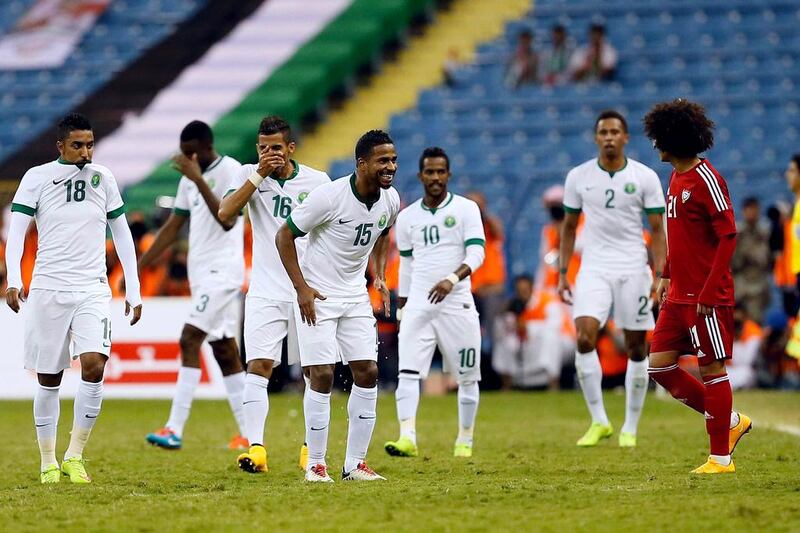At stake tonight, three hugely important points on the road to the 2018 World Cup in Russia. Step back from the clash between Saudi Arabia and the UAE in Jeddah and take a wider view and you will see a heated rivalry developing between the Arabian Gulf’s two best teams.
Neither Mahdi Ali, the UAE manager, nor Saudi Arabia’s new coach, Bert van Marwijk, will care much for that description. But, like it or not, it is happening.
This could be the most important encounter between the neighbours in years.
Having been awarded a 3-0 win over Malaysia after crowd trouble prematurely ended the qualifier at Shah Alam last month, the Saudis now lead Group A with nine points, with the UAE on seven.
A defeat for the UAE will leave them five points adrift and, halfway through this group stage, that would leave them increasingly looking to progress to the final group stages next year as one of the four best second-placed teams.
Also, a vastly improved Palestine team is waiting to pounce on any slip-ups by the two favourites.
Reaching a World Cup is never easy, but the UAE’s path has become perilous.
The national team have already dropped two points, on an artificial pitch against Palestine in the West Bank.
The same fixture involving Saudi Arabia, which was set for Tuesday, has been postponed while the countries haggle over whether to move the game to a neutral ground.
The UAE have not beaten Saudi Arabia since a last-minute Ismail Matar goal took the UAE to the final of the 2007 Gulf Cup of Nations in Abu Dhabi.
ALSO READ
[ Effort, not history, matters for UAE’s Mahdi Ali as they try to breach Saudi Arabia ]
[ Saudi Arabia-Palestine World Cup qualifier postponed to decide on site ]
[ Making a case for Majed Hassan and Habib Fardan as UAE’s first-choice midfield ]
Since then the Emiratis have lost two World Cup qualifiers and two Gulf Cup semi-finals. At last year’s Gulf Cup, in Riyadh, a previously flat Saudi Arabia side roused themselves to beat the UAE 3-2 in a memorable semi-final, before succumbing 3-1 to Qatar in the final.
Crucially that day, the hosts devised a pragmatic blueprint of how to deal with UAE danger man Omar Abdulrahman.
For 20 minutes, the Al Ain playmaker was isolated on the right wing, often having to deal with the unkind attentions of two or three Saudi markers.
Eventually the rough treatment got the better of his legs, and he limped off in the 27th minute. Though the UAE engineered a heroic comeback in the second half to recover from a two-goal deficit, their hopes of retaining the title they had won in Bahrain in 2013 had disappeared down the tunnel with their best player.
Yet it was the UAE that went on to excel at the 2015 Asian Cup in Australia, finishing third, while Saudi Arabia departed at the group stage.
The UAE are now ranked 70th in the world, fifth in Asia, and the highest Gulf team. With Saudi Arabia at 88, the Emiratis are, statistically at least, better than their counterparts.
But can they prove it where it really matters, on the pitch? It is a strange quirk that the recent period of UAE excellence, and Saudi Arabia’s relative decline since reaching the 2006 World Cup finals, has yet to produce a win, or even a draw, for the Emiratis.
Historically, the numbers are daunting: the UAE have won only six of 33 matches with the Saudis, with six draws and 21 defeats. The UAE’s only away victory in the rivalry was a 2-0 win in a friendly back in 2001. Last season, Al Hilal beat Al Ain, and a frustrated Abdulrahman, in the Asian Champions League semi-finals.
This year, the Western Zone semi-final is finely poised after Al Hilal and Al Ahli drew 1-1 in Riyadh in the first leg.
At international and club level, the rivalry is getting fiercer, and tighter. There have been some memorable meetings.
A magnificent 2-2 draw at the 1988 Gulf Cup in front of a heaving King Fahd International Stadium; Saudi Arabia clinching the 1996 Asian Cup with a penalty shoot-out win over the hosts at Zayed Sports City; Ismail Matar’s glorious winner on the way to clinching the UAE’s first Gulf Cup in 2007; and last year’s dramatic clash in Riyadh.
Mahdi Ali will pay little attention to history, though, or countenance talk of rivalries. But he will need his team to achieve something the UAE has never managed before if they are to go back to the top of Group A: a victory in a competitive match on Saudi Arabian soil.
akhaled@thenational.ae
Follow us on Twitter @NatSportUAE





